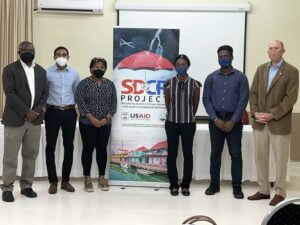Eight young innovators from across the Eastern Caribbean received information technology (IT) equipment from the United States Government, through the United States Agency for International Development (USAID), to support their innovation and entrepreneurship in areas related to climate and disaster resilience.
The suite of IT products was presented today during a brief ceremony co-hosted by the USAID/Eastern and Southern Caribbean (USAID/ESC) and the Caribbean Institute for Meteorology and Hydrology (CIMH). The recipients are currently enrolled in the Caribbean Youth Livelihoods Internship Program (CYLIP), established under the USAID funded Strengthening Disaster and Climate Resilience (SDCR) Program being implemented by CIMH.
They include Alyssa White (Barbados); Britney Ramdeen (Grenada); Daniel Worrell (Barbados); Michael Nicholls (Barbados); Racheal Nestor (Saint Lucia); Sasha Lawrence (Dominica); Saffire Fields (Barbados); and Shawayne Maynard (Barbados).

Through the CYLIP, interns gain practical experience which emphasizes the nexus between entrepreneurship, innovation, and science. The equipment provided includes laptops, software and hard drives needed to access and engage in training, courses, knowledge sharing and skills development. The nine-month internship promotes pathways for professional development and employment for recent university graduates. It strengthens their abilities to creatively and critically conceptualize how industry, innovation and science can connect to solve issues being addressed under the SDCR Project. Key components include skills training in climate services, early warning systems, management and business development, as well as placements with partner agencies fostering resilience to the impact of climate change and variability.
Director, General Development Office, USAID/ESC Kipp Sutton remarked at the handover, “Today’s young people are the leaders of tomorrow and empowering them with tools to succeed has long-term positive impacts in the region. One of the ways USAID invests in the Caribbean is by training young men and women in entrepreneurship and marketable skills while simultaneously fostering a business environment that will leverage their skills to promote innovation, partnerships, and economic growth.”
Daniel Worrell, a CYLIP intern from Barbados remarked, “Entrepreneurship plays a critical role in development, and this growth should especially be well sustained and encouraged in the STEM fields. I am grateful for this invaluable learning and developmental experience because of CYLIP.”
“As the Caribbean continues to face increasingly complex climate and disaster risk challenges, the CYLIP empowers youth to identify, develop, and apply solutions for a more resilient and sustainable region. Interns are encouraged to transition their CYLIP experiences into various forms of enterprise development including start-up businesses,” said Dr. David Farrell, Principal of CIMH during the ceremony. “CIMH is grateful for support from the United States Government through USAID and under the SDCR Project to build a cohort of young trailblazers that will help drive regional innovation during and post the COVID-19 pandemic.”
Sasha Lawrence, a CYLIP intern from Dominica remarked, “In my opinion, the biggest challenge of building resilience to climate and disaster risks in the Caribbean is its extensive and interesting tectonic environment. It is important to integrate science, technology and innovation, with entrepreneurship and business development skills to ensure I’ll be able to implement the newest ways to address such issues.”
Launched in August 2019, the SDCR Project is a US$1,800,000 USAID funded initiative in the Eastern Caribbean, made possible through the generous support from the American people. Through the SDCR, the United States is working with implementing agency the CIMH to build regional resilience through improved disaster recovery and response systems and improved hydrological and hydrometeorological early warning systems. The Program assists decision makers in the region to plan, design, and implement programs to reduce the impacts of natural disasters. The SDCR addresses challenges presented by the increased quantity and intensity of storms and variability in climatic patterns in the region such as flooding, drought, and sea level rise, impacting economies and well-being through impacts on areas such as health, tourism, and agriculture-related infrastructure and livelihoods.









Leave a Reply